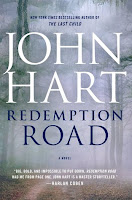Since I last posted a review (it feels like a century ago!) I've undergone a very significant life event: I have begun working again. I am now the Donor Services Manager for the
Central Alabama Community Foundation, and while the work could not be more different from my nearly three decade gig as a bookseller, it is just as wholly satisfying.
When I was a bookseller, my job every day was to serve as a matchmaker between the written word and folks who needed something good to read. The CACF is also a matchmaker of a sort. Donor's gifts are pooled for long term investment income, and either by their direction, or through a grants and scholarships process, those monies are then distributed to non-profit entities in Central Alabama. My great-grandfather, Jefferson Davis Beauregard Lee Russell Crawford, known as The Reverend J. Russell "Jack" Crawford, once said, "Surely it takes grace, grit, gumption, and greenbacks to succeed." What a fortunate thing it is that each of those four elements come into play every day at the Foundation, and even more rewarding is that I get to play an admittedly small role in helping others make so many good things happen.
All those years working as a bookseller inculcated within me the desire to provide an experience to each customer that left them feeling appreciated and important. More than any other skill I have brought with me to this new place, this is the one that comes from my heart. Whether a donor has entrusted the Foundation with a sizable gift, or a contributor has added to a scholarship fund with the change they found in their sofa, I want them each to come away from any encounter we might have knowing that the Foundation and I have the utmost respect and gratitude for the role they play in making our shared communities the best that they can be.
*****
Anyway......
My reading has slowed down a bit of late, which is not to say that I haven't been thoroughly doing it. The book I'm reviewing today is one that my former boss (and past, present, and future sister-in-law) strongly recommended I read..... as in dragged me into her house and put it in my hands and then pushed me out the door saying, "We'll talk when you finish it."
At least that's the way I remember it.
Reed Farrel Coleman is by no stretch a newcomer, but I'd never read him. Shoot. I'll be honest here... I'd never even
heard of him until he made an appearance at the 2015 Alabama Book Festival, and even then I wasn't drawn to his books. Not a clue why -- that's a
me thing and not a
him thing. I decided to dive in with
Where It Hurts because it's the first in a new series, so Reed and I could both start out fresh with one another.
And boy, was this ever a good read. Gus Murphy is a courtesy van driver for a hotel. Gus had once been a happily married police officer, but that life was over for him in the aftermath of a profound personal tragedy. A phone call from one of the bad guys he'd brushed up against more than once in his former life, asking for his help in finding out who killed his son, draws Gus back into the orbit of people he'd never thought to work with (or against!) again. Murphy, who had lost his own son, is drawn to help against his better judgment.
While the plot plays out in great fashion, what I take away from Where It Hurts is that Coleman writes with tremendous heart and compassion. There were numerous times when I felt like I was sitting across a table, warming my hands around a cup of coffee, letting Gus just pour it all out.
I am so grateful to Cheryl for literally putting this one into my hands, and am looking forward to more Gus Murphy novels in the future.
Highly recommended!









